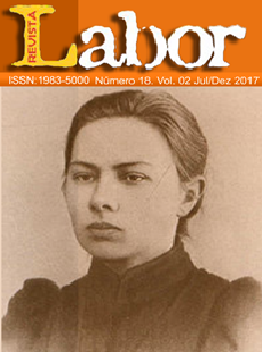AS ORIGENS IDEOLÓGICAS DA LEI SMITH-HUGHES DE 1917 DOS ESTADOS UNIDOS DA AMÉRICA
DOI:
https://doi.org/10.29148/labor.v2i18.33517Keywords:
Smith-Hughes. Dewey. Sindicatos. História da educação vocacional. Eficiência social.Abstract
Investigação sobre as origens ideológicas da educação vocacional estadunidense no início do século XX, buscando mapear os principais atores na aprovação da lei Smith-Hughes e seus interesses por meio de pesquisa bibliográfica. Como resultado, ficou claro que foi necessária, no processo que culminou com a aprovação da primeira lei que garantia financiamento federal à educação vocacional nos Estados Unidos, uma coligação de atores cuja cooperação seria bastante improvável em qualquer circunstância: movimentos de trabalhadores, educadores, industriais, agricultores. Em meio a tantos diferentes interesses e posicionamentos quanto à forma que a educação vocacional deveria ter e quanto aos propósitos que ela deveria servir, os grupos mais influentes conseguiram se unir em torno do desejo de racionalizar a formação para o trabalho sem atacar diretamente a estrutura de classes e o sistema capitalista. O resultado foi que questões sobre a natureza do trabalho e desigualdade forma transformadas em questões de educação e treinamento.
ABSTRACT
Investigation of the ideological origins of US vocational education in the early twentieth century, seeking to map the main agents involved in the approval of the Smith-Hughes law and its interests through bibliographic research. As a result, it was learned that in the process that culminated in the passage of the first law guaranteeing federal funding for vocational education in the United States, a coalition of actors was formed, whose cooperation would be quite improbable under all circumstances: workers, educators, industrial movements, farmers. In the midst of so many different interests and positions regarding the form that vocational education should take and the purposes it should serve, the most influential groups were able to unite around the desire to rationalize training for work without directly attacking the structure of classes and the capitalist system. The result that questions about the nature of work and inequality were turned into issues of education and training.
References
APPLE, M. W. Ideology and curriculum. New York: Routledge, 1990.
BOWLES, S.; GINTIS, H. Schooling in capitalist America. New York: Basic Books, 1976.
COLE, P. Wobblies on the waterfront : interracial unionism in progressive-era Philadelphia. Baltimore: University of Illinois Press, 2007.
DEWEY, J. Some dangers in the present movement for industrial education. Child labor bulletin, v. 1, n. 4, p. 69-74, 1913.
______. A policy of industrial education. New republic, v. 1, n. 11-12, 1914.
______. Industrial education - a wrong kind. New republic, v. 2, p. 73-74, 1915.
______. The need of an industrial education in an industrial democracy. Manual training and vocational education, v. 17, p. 409-414, 1916.
DEWEY, J. C. On Industrial Education. Curriculum Inquiry, v. 7, n. 1, p. 53-60, 1977.
DROST, W. H. Social efficiency reexamined: the Dewey-Snedden controversy. Curriculum inquiry, v. 7, n. 1, p. 19-32, 1977.
ENGERMAN, D. C. John Dewey and the Soviet Union: pragmatism meets revolution. Modern intellectual history, v. 3, n. 1, p. 33-63, 2006.
HILLISON, J. The coalition that supported the Smith-Hughes Act or a case for strange bedfellows. Journal of vocational and technical education, v. 11, n. 2, p. 4-11, 1995.
HYSLOP-MARGISON, E. J. An assessment of the historical arguments in vocational education reform. Journal of career and technical education, v. 17, n. 1, p. 23-30, 2000.
KANTOR, H. Work, education, and vocational reform: the ideological origins of vocational education, 1890-1920. American journal of education, v. 94, n. 4, p. 401-426, 1986.
SNEDDEN, D. Fundamental distinctions between liberal and vocational education. Curriculum Inquiry, v. 7, n. 1, p. 41-52, 1977.
SNEDDEN, D.; DEWEY, J. Two communications. Curriculum Inquiry, v. 7, n. 1, p. 33-37, 1977.
WIKIPEDIA. Industrial Workers of the World, 2004. Disponível em: < https://en.wikipedia.org/wiki/Industrial_Workers_of_the_World>. Acesso em 25 de outubro de 2017.
WIRTH, A. G. John Dewey's philosophical opposition to Smith-Hughes type vocational eduation. Educational theory, v. 22, n. 1, p. 69-77, 1972.
______. Philosophical issues in the vocational-liberal studies controversy (1900-1917): John Dewey vs. the social efficiency philosophers. Studies in philosophy and education, v. 8, n. 3, p. 169-182, 1974.
Downloads
Published
How to Cite
Issue
Section
License
Autores que publicam nesta revista concordam com os seguintes termos:
1. Autores mantém os direitos autorais e concedem à revista o direito de primeira publicação, com o trabalho simultaneamente licenciado sob a Licença Creative Commons Attribution que permite o compartilhamento do trabalho com reconhecimento da autoria e publicação inicial nesta revista.
2. Autores têm autorização para assumir contratos adicionais separadamente, para distribuição não-exclusiva da versão do trabalho publicada nesta revista (ex.: publicar em repositório institucional ou como capítulo de livro), com reconhecimento de autoria e publicação inicial nesta revista.
3. Autores têm permissão e são estimulados a publicar e distribuir seu trabalho online (ex.: em repositórios institucionais ou na sua página pessoal) durante o processo editorial informando que o artigo está em processo de publicação, já que isso pode aumentar o impacto e a citação do trabalho publicado (Veja O Efeito do Acesso Livre).


